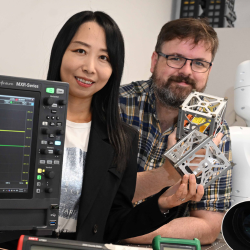-
Study
-
Undergraduate
- Search for a Course
- Undergraduate Open Day & Events
- Application Guides
- Northumbria University UCAS Exhibitions
- Foundation Years
- Undergraduate Fees & Funding
- School & College Outreach
- Continuing Professional Development
-
Postgraduate
- Postgraduate Study Degree
- Postgraduate Research Degrees
- Postgraduate Open Days and Events
- Postgraduate Fees & Funding
- Flexible Learning
- Thinking about a Masters?
- Continuing Professional Development
- Change Direction
-
Student Life
- The Hub - Student Blog
- Accommodation
- Life in Newcastle
- Support for Students
- Careers
- Information for Parents
- Students' Union
- Northumbria Sport
- Be Part of It
-
-
International
International
Northumbria’s global footprint touches every continent across the world, through our global partnerships across 17 institutions in 10 countries, to our 277,000 strong alumni community and 150 recruitment partners – we prepare our students for the challenges of tomorrow. Discover more about how to join Northumbria’s global family or our partnerships.
View our Global Footprint-
Applying to Northumbria
- European Union
- Our London Campus
- Northumbria Pathway
- International Events
- Entry Requirements and Country Representatives
- Regional Offices
-
Northumbria Language Centre
- Faculty Requirements
- Acceptable English Requirements
- Pre-sessional English Language and Study Skills
- Academic Language Skills Programmes (ALS)
-
International Fees, Funding & Scholarships
- International Undergraduate Fees
- International Undergraduate Funding
- International Masters Fees
- International Masters Funding
- International Postgraduate Research Fees
- International Postgraduate Research Funding
- International Money Matters
-
Life at Northumbria
- International student support
- Careers
-
International Mobility
- Current Northumbria Students
- Incoming Exchange Students
-
-
Business
Business
The world is changing faster than ever before. The future is there to be won by organisations who find ways to turn today's possibilities into tomorrows competitive edge. In a connected world, collaboration can be the key to success.
More on our Business Services -
Research
Research
Northumbria is a research-rich, business-focused, professional university with a global reputation for academic quality. We conduct ground-breaking research that is responsive to the science & technology, health & well being, economic and social and arts & cultural needs for the communities
Discover more about our Research -
About Us
-
About Northumbria
- Our Strategy
- Our Staff
- Place and Partnerships
- Student Profiles
- Alumni Profiles
- Leadership & Governance
- Academic Departments
- University Services
- History of Northumbria
- Contact us
- Online Shop
-
-
Alumni
Alumni
Northumbria University is renowned for the calibre of its business-ready graduates. Our alumni network has over 244,000 graduates based in 178 countries worldwide in a range of sectors, our alumni are making a real impact on the world.
Our Alumni - Work For Us
What will I learn on this module?
The module aims to provide you with the practical ability and understanding of the software development process to enable the production of efficient and robust software applications . The module follows on from the first-year module “Programming 1” and combines lectures and workshops that are designed to further develop your problem solving and algorithmic thinking focussed on a specific topic chosen from the areas of Computer Forensics, Computer Networking or Cybersecurity.
How will I learn on this module?
You will be taught using a combination of lectures and workshop/lab sessions. The lectures will cover the theoretical knowledge required for you to complete various guided exercises provided during the workshop/lab sessions.
How will I be supported academically on this module?
You will be guided through and provided feedback on exercises during the timetabled sessions. In addition, the eLP (electronic learning portal) blackboard will be used to provide extensive supporting material.
What will I be expected to read on this module?
All modules at Northumbria include a range of reading materials that students are expected to engage with. Online reading lists (provided after enrolment) give you access to your reading material for your modules. The Library works in partnership with your module tutors to ensure you have access to the material that you need.
What will I be expected to achieve?
Knowledge & Understanding:
1. Demonstrate knowledge and critical understanding of the essential facts, concepts, principles, theories, challenges and techniques for developing software applications in your discipline.
2. Apply knowledge and understanding of techniques and tools to solve complex computer-based problems.
Intellectual / Professional skills & abilities:
3. Identify and analyse problems and select and apply effective methods and tools for their solution.
4. Use a range of tools, knowledge and technologies to Design, build, test and evaluate a prototype product or service for a specific computing problem domain.
Personal Values Attributes (Global / Cultural awareness, Ethics, Curiosity) (PVA):
5. Effectively communicate information, arguments and analysis, in a professional report.
How will I be assessed?
You will be assessed on the submission of a software application selected from one of the areas of Computer Forensics, Computer Networking or Cybersecurity. This will involve the development of a significant, robust software application using a professional software development process that is fully documented.
Pre-requisite(s)
None
Co-requisite(s)
None
Module abstract
This module aims to provide you with the practical ability and understanding of the software development process to enable the production of efficient and robust software applications. The module follows on from the first-year module “Programming 1” and combines lectures and workshops/labs that are designed to further develop your problem solving and algorithmic thinking focussed on a specific topic chosen from the areas of Computer Forensics, Computer Networking or Cybersecurity. You will have the opportunity to develop a case study project that will involve the development of a significant, robust software application using a professional software development process.
Course info
UCAS Code GF44
Credits 20
Level of Study Undergraduate
Mode of Study 3 years Full Time or 4 years with a placement (sandwich)/study abroad
Department Computer and Information Sciences
Location City Campus, Northumbria University
City Newcastle
All information is accurate at the time of sharing.
Full time Courses are primarily delivered via on-campus face to face learning but could include elements of online learning. Most courses run as planned and as promoted on our website and via our marketing materials, but if there are any substantial changes (as determined by the Competition and Markets Authority) to a course or there is the potential that course may be withdrawn, we will notify all affected applicants as soon as possible with advice and guidance regarding their options. It is also important to be aware that optional modules listed on course pages may be subject to change depending on uptake numbers each year.
Contact time is subject to increase or decrease in line with possible restrictions imposed by the government or the University in the interest of maintaining the health and safety and wellbeing of students, staff, and visitors if this is deemed necessary in future.
Useful Links
Find out about our distinctive approach at
www.northumbria.ac.uk/exp
Admissions Terms and Conditions
northumbria.ac.uk/terms
Fees and Funding
northumbria.ac.uk/fees
Admissions Policy
northumbria.ac.uk/adpolicy
Admissions Complaints Policy
northumbria.ac.uk/complaints














